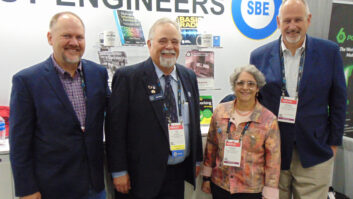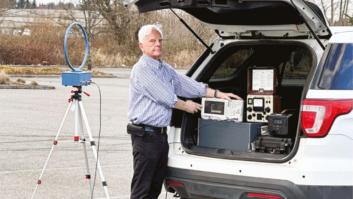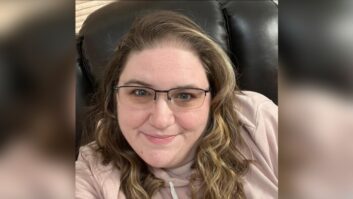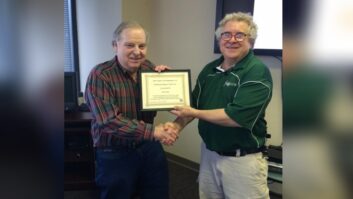There wasn’t a single computer in the building.

It was the early 1990s. Conrad Trautmann was the chief engineer at WSYR(AM) in Syracuse, N.Y.
“Not a computer in sight and no automation. The closest thing to a computer was the Okidata printer connected to the AP wire in the station’s newsroom.”
He finds it remarkable how technology has changed in those intervening years. “Hard to imagine, when I look back. Now it’s the cloud and AI doing music logs. It’s been quite the leap to where we are today. It’s been a great opportunity for all of us to learn and adapt.”
Conrad Trautmann is the recipient of the Radio World Excellence in Engineering Award for 2024–25. He is chief technology officer for Cumulus Media, reporting directly to President/CEO Mary Berner.
“We’re saluting Conrad for his work as a member of Cumulus’ executive team and his innovations and leadership in broadcast engineering and information technology,” Radio World Editor in Chief Paul McLane said.
“This includes his role helping to lead the company through technical challenges that were presented by the pandemic; his exploration of how new technologies can advance business goals; his willingness to test how new radio programs and services can enhance radio’s prominence in the connected car dashboard; and for modeling how a radio engineer can serve our industry through developing expertise in areas such as digital platforms, AI, cybersecurity, real estate management and purchasing.”
McLane said the award also honors him for his service to the Society of Broadcast Engineers — at the national level and in his local New York Chapter. SBE recently elevated him to its highest rank of Fellow. His nominations for Fellow remarked on Trautmann’s role as “an invaluable mentor and technical resource” and “a true gentleman who can communicate with a group of engineers one moment and then walk into a boardroom and present such a level of confidence like no other.”
Radio World also salutes his work as an industry thought leader in groups like the Radio Technology Committee of the National Association of Broadcasters.
Recipients of the Radio World Excellence in Engineering Award represent the highest ideals of the broadcast engineering profession and reflect those ideals through contributions to the industry.
He is the 21st recipient. Other recent winners include Steve Shultis, Roz Clark, Jason Ornellas and Dave Kolesar. Last year’s honoree was Alan Jurison (the complete list is at bottom).
“Visionary”
Trautmann, 61, holds one of the industry’s top engineering jobs. Cumulus is the third-largest U.S. radio company by revenue, according to BIA Advisory Services, and owns approximately 400 radio stations in 84 markets. Trautmann is responsible for its broadcast distribution, operations and IT, as well as its real estate portfolio and capital budget.
“What truly sets Conrad apart is his unwavering commitment to supporting others, demonstrating what progress and growth look like for everyone — an undeniable testament to his character,” Mary Berner told Radio World.
“His enormous passion for the industry, vast and ever-growing knowledge base, exceptional leadership and countless contributions have significantly transformed not only our company but the entire industry as well.”
Berner called him “visionary.”

Kim Guthrie is a strategic advisor to iHeartMedia and a former president/CEO of Cox Media Group. But in the 1990s she was a first-time general manager and Trautmann was her chief engineer.
“I learned a lot about the technical side of the business from Conrad and he was never afraid to tackle the smallest task of a project or to suggest an improvement for our operation,” she said.
“Rarely do you find a teammate that is as well-rounded as Conrad Trautmann. He is resourceful, smart, efficient, innovative and forward-thinking – ‘typical’ traits you might find in a ‘typical’ engineer. However, the other side of Conrad is truly his force-multiplier: Conrad is also patient, kind, thoughtful, eloquent, and a superb strategic thought-partner and ally. I consider him a true friend.”
Seeking understanding
Cumulus Media has corporate offices in New York City, but Trautmann has worked from his home in Connecticut since the pandemic. The arrangement saves him multiple hours of commute time each day.
“My days primarily consist of Zoom or Teams calls all day, so I can do that from anywhere. I do interact with people all day long but it’s remote; and the people I interact with are not in New York anyway.”
Trautmann grew up in Lindenhurst on Long Island. He studied electrical, electronic and communications engineering technology at Farmingdale State University of New York, where he was chief engineer for the campus radio station. He spent six years as a machinery technician in the U.S. Coast Guard.
He began his broadcast technology career in the 1980s as CE at WEBE(FM) in Westport, Conn. — during which time he authored his first article in Radio World — and was later CE for stations run by ML Media Partners, Cox Radio and Clear Channel Radio.
He joined Westwood One in 2000 as EVP for technology.

Trautmann has experience in project management, people management, and capital and operational budget management. A particular skill is his ability to take highly technical topics and make them understandable for everyone.
“I never play the ‘I’m-smarter-than-you’ card on technology; I don’t think that ever helps matters. I try to educate people so they do understand a bit more.”
Trautmann manages a team of engineers and IT staff. Cumulus has a regional structure for its radio markets, with eight regional directors of engineering and eight regional directors of IT. His direct reports include the head of software development and business systems, two VPs of engineering, the head of IT infrastructure and security, the head of BSI automation, and the head of real estate and telecommunications.
He aims for a collaborative style of management.
“I like to look for ways to help those who report to me to be successful in their roles and look for ways to break down barriers to help them do their jobs.”
Trends that are playing out across the U.S. radio industry are true at Cumulus. Updating equipment and technology has been a primary focus in recent years, from replacing legacy and failing equipment to finding more efficiencies in station clusters, especially post-Covid.
“We proved in short order it was clear we could work remotely. We realized we don’t need all that real estate any longer. That’s been responsible for a lot of the consolidations we are doing and moves to smaller spaces. The fact is that many of our stations that supported 150 employees now support a fraction of that, but they are still able to put out a quality product thanks to the technology available.”
Digital experiments
As a rule of thumb, he says, many of the company’s broadcast facilities have cut their footprint by about half. Cumulus also no longer owns most of its broadcast towers, having sold many several years ago to Vertical Bridge; now it leases space on them.
These days, he spends much of his time not only on real estate issues but on cybersecurity.

“Having the right people in place who know and understand where the attack vectors are is crucial. We have great people who know how to protect us. We’re a Microsoft shop so we also depend on them to give us guidance about vulnerabilities. We also are a member of the Cybersecurity Infrastructure Security Agency. And we belong to a media information sharing group that collaborates on current cyber threats.”
Meanwhile, the use of artificial intelligence across the company’s business segments has been guided from the top.
“We tell our employees to use it as if they were on a chat board or social media platform. You have to be careful not to share confidential information because we know AI learns off that.”
Cumulus has authorized the use of Microsoft Copilot for its employees to use as an AI tool, he says. The company hasn’t ventured far into voice cloning but has explored it.
“There are AI tools that have our interest. Some of the spec spot generators hold a lot of promise. We are interested in anything that can help our efficiency.”
An experiment with all-digital HD Radio on the AM band ended recently. In 2021 the company launched “Digital AM 1230 HD” on WFAS(AM) in White Plains, N.Y. The 1 kW station was just north of New York City and could be heard in the northern suburbs of the top media market in the United States.
But this fall Cumulus turned off the station and returned the license to the FCC. Trautmann says the experience with the MA3 mode was informative.
“It was wonderful to see what it did to the signal. It essentially doubled the range of the signal. Plus, the quality of the sound when you devote the entire channel and all the bandwidth to digital, it sounded as good as any streaming station — on par with FM I think,” he said.
Thus he considers that experiment a success from a technology standpoint. “It showed all-digital MA3 can work. As far as the business component, being a 1,000-watt AM competing in the shadow of New York City is tough.”
In another technology initiative, Cumulus this year launched radio formats on two HD Radio channels in Nashville, curated by Super Hi-Fi’s AI-based Program Director platform. The channels are viewed by Cumulus as a testing ground. The formats are broadcast on the HD2 and HD3 channels of FM station WGFX.

“It has gone well. What we learned is that it’s possible to feed an HD channel directly from the internet. The stream comes from Super Hi-Fi. We could have fed the transmitter directly with the digital audio if it hadn’t been for EAS. We had to break the stream audio out to go through the external EAS box in order to be compliant.
“The point is, once EAS can be virtualized, that component could be added to the computer or the transmitter. Everything you need to do an over-the-air broadcast, even the processing, can come in via an internet stream and be handled by the software.”
Cumulus uses Triton for streaming audio and Omny Studio for podcast storage, Trautmann says. “Our main focus is being everywhere we can be for delivery. We have a digital team that manages most of that,” he said. The audio streams of its stations and podcasts also are available on TuneIn.
As part of his Cumulus responsibilities, Trautmann oversees technical aspects of the company’s Westwood One network, which produces nationally syndicated sports, news and entertainment content. Trautmann says the network is looking to eventually move distribution completely to the internet.
“People have been asking me for 15 years: ‘Why can’t we distribute over the internet? Netflix does it.’ What people don’t realize is that radio station studios all have their own environment. You can’t just send out an app and say this is how you are receiving your content from now on. It has to be reliable. It has to have the closures. We have to serve a wide variety of clients.
“The receiver fleet we have deployed on all of our stations right now is internet-capable, so we are looking at moving 100% to the internet, or at least partially delivering content, especially non-live events, that way.”
Westwood One also provided one of his career highlights: working the 2004 Athens Summer Olympics, where he oversaw on-site technical aspects of the network’s coverage.
“Literally media from all over the world were there. It was an amazing event; and to have every country in the world covering it really makes you appreciate the significance of it.”

POTA
Trautmann also occupies an unusual position for an engineer: He serves on the radio board of directors of the National Association of Broadcasters in the designated seat formerly filled by CEO Mary Berner.
“I was very intimidated when I was first asked to serve. I wondered if I belonged in the room with every top radio executive in the country,” he said.
“But after the first meeting, and how welcoming everyone was to me, I feel like I am a good representative for Cumulus. I think bringing the technology expertise to that room is a good thing. The NAB’s (CTO) Sam Metheny is the only other technologist in the room for those meetings, so this is an opportunity to bring the technology component to the board.
“Being at these meetings and being able to contribute to the technical aspects of the challenges facing our industry is important. I think they need more technical representation, honestly.”
Cumulus, he said, is “the most employee-focused company” he has ever worked for.
“Every decision is filtered through ‘How does it affect our employees?’” he said. “They are very conscious about trying to make sure the employees are being taken care of and that this is a good place to work. That way we’ve been able to attract good employees.”
The pandemic not only caused a seismic shift in workplace technology, it also gave Trautmann the opportunity to get back into ham radio. He has embraced Parks on the Air (POTA), a radio sport program that encourages amateur radio operators to visit parks and use portable equipment to transmit. “It has taken me to a lot of state and national parks I might never have gone to.”
Trautmann lives with his wife, Dianne, in Trumbull, Conn. They have two daughters, Rhiannon and Katarina.
OUR EXCELLENCE HONOR ROLL
2004 Andy Andreson
2005 Mike Starling
2006 John Lyons
2007 Clay Freinwald
2008 Jeff Littlejohn
2009 Gary Kline
2010 Milford Smith
2011 Barry Thomas
2012 Paul Brenner
2013 Marty Garrison
2014 Wayne Pecena
2015 David H. Layer
2016–17 Michael Cooney
2017–18 Larry Wilkins
2018–19 Russ Mundschenk
2019–20 Dave Kolesar
2020–21 Jason Ornellas
2021–22 Roz Clark
2023 Steve Shultis
2024 Alan Jurison
2025 Conrad Trautmann







